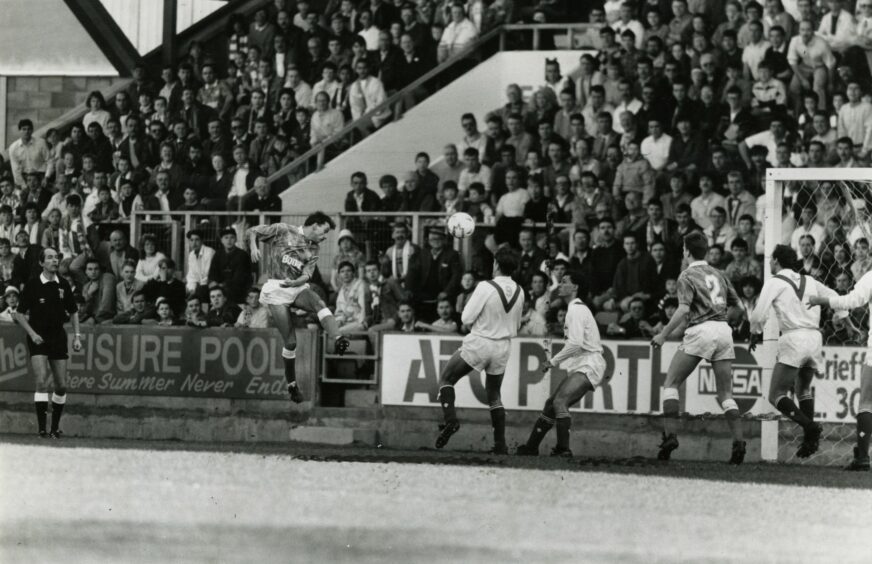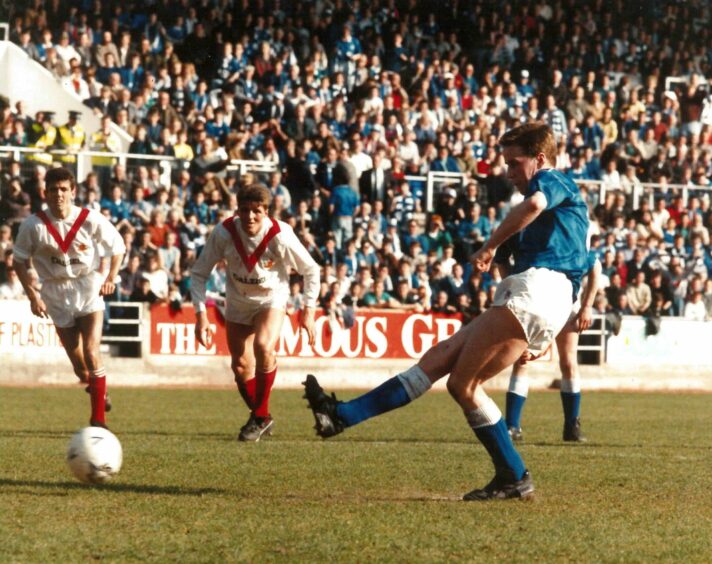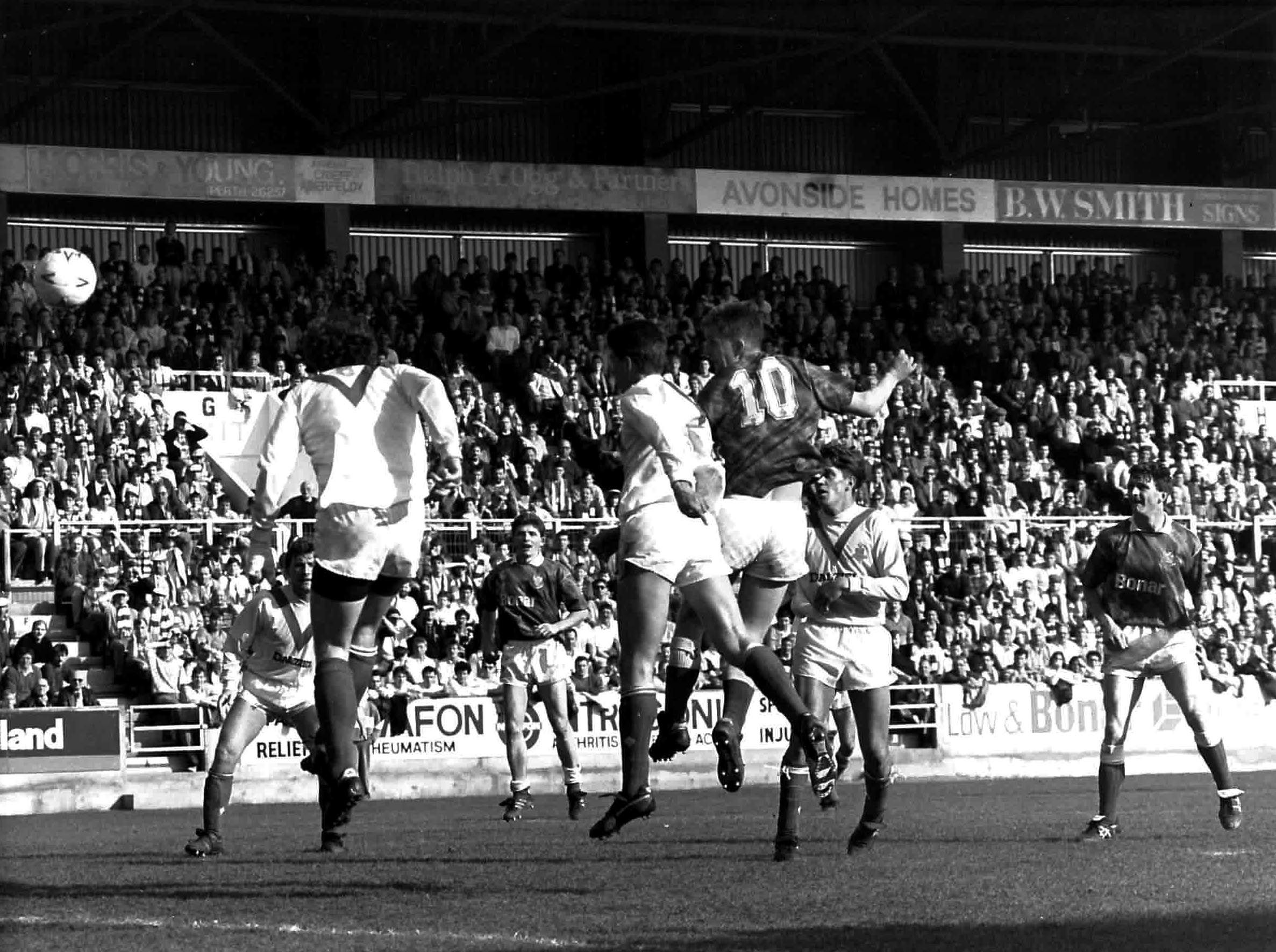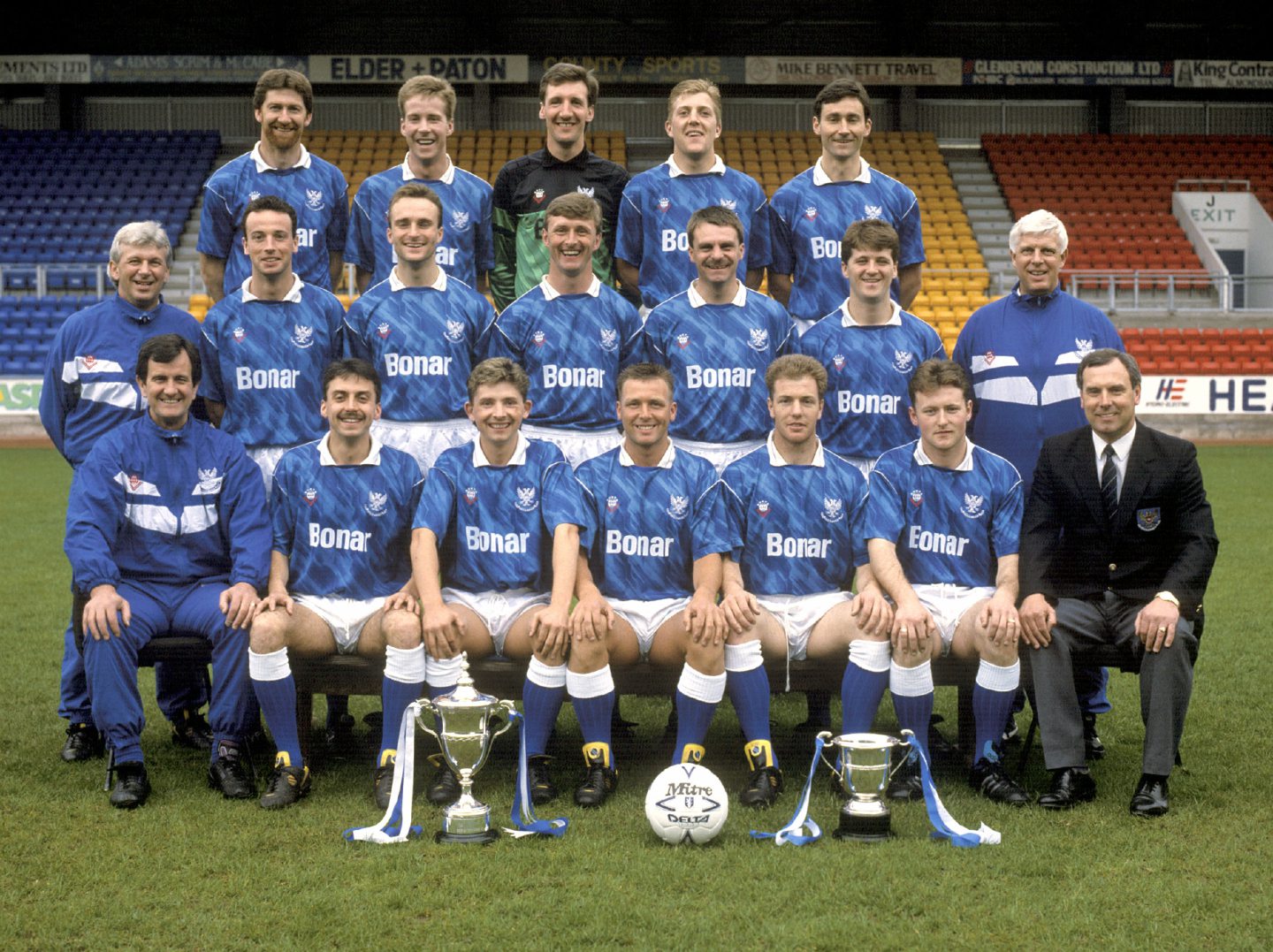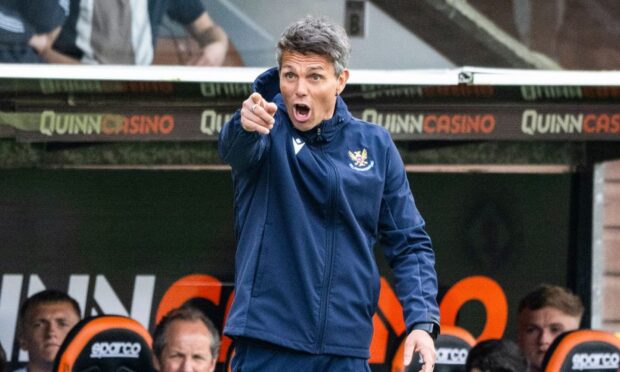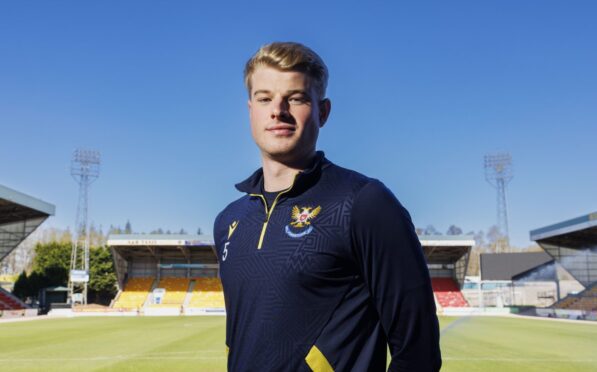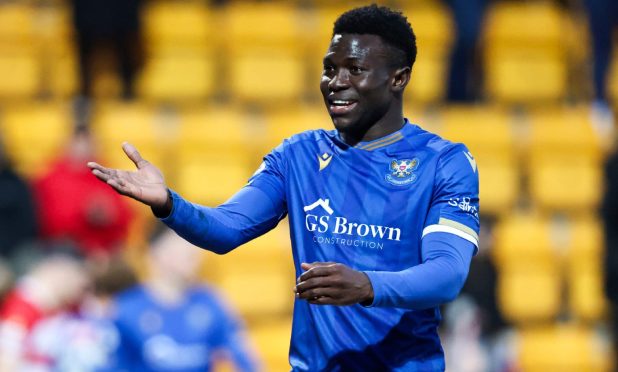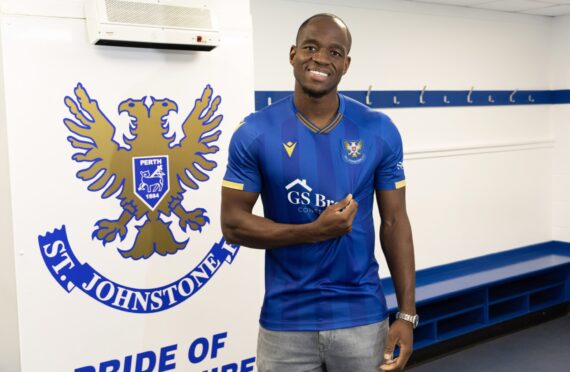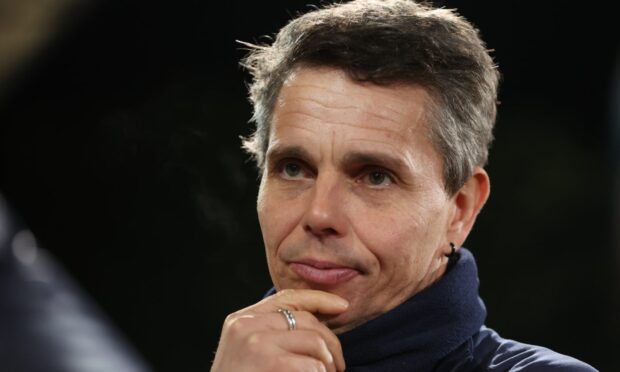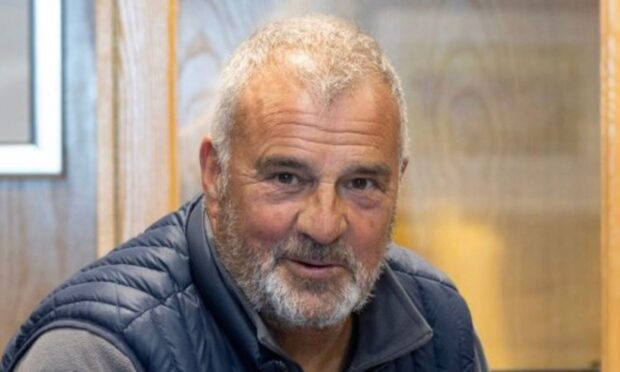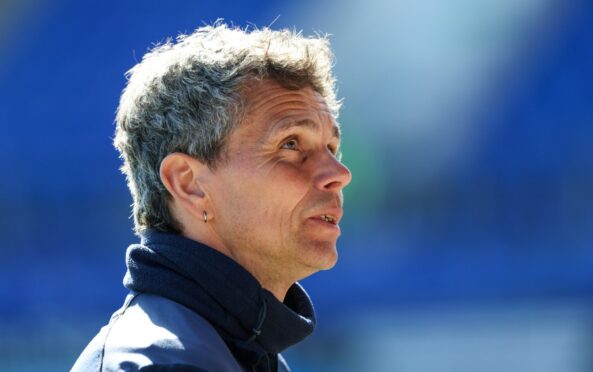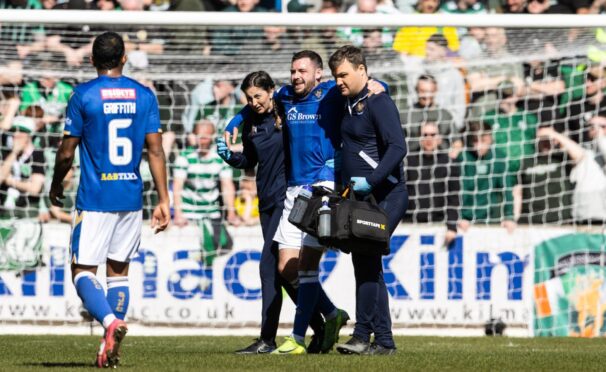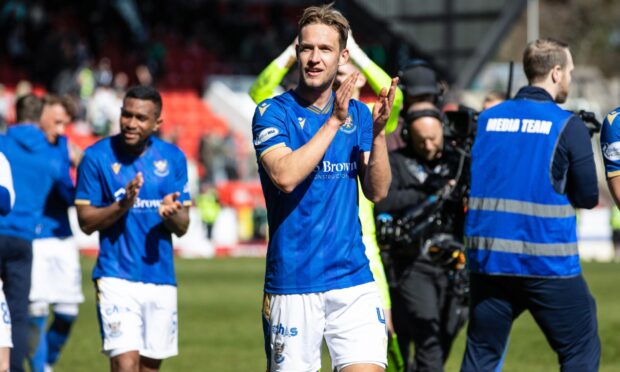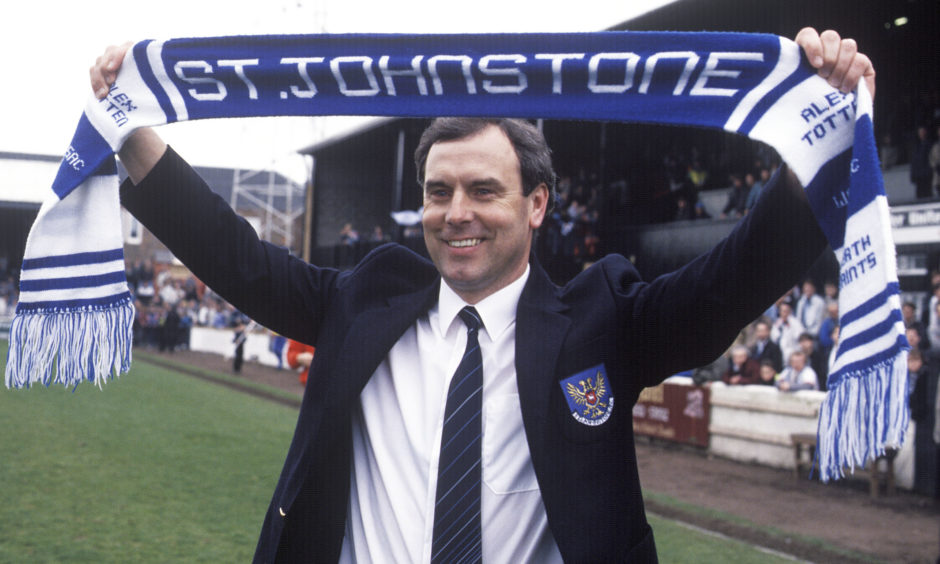
Putting five unanswered goals past the best post-Ferguson Aberdeen team in your first season back in the top flight?
Beating your local rivals 7-2 in a New Year’s Day game that saw the best pantomime villain of his generation, Chic Charnley, sent off for fighting with his own team-mate?
Beating Dundee again to qualify for Europe on the last day of a season?
Drawing with star-studded Monaco in the Uefa Cup and knocking Rosenborg and Luzern out of its rebranded equivalent?
Twice securing league titles on your own turf?
Worthy of St Johnstone Football Club’s greatest game debate, one and all. The problem is, by the time all of those matches had been won or drawn, that debate had already been settled.
McDiarmid Park is celebrating its 30th season but the most iconic afternoon or evening in the stadium took place in its first. March 31, 1990 – St Johnstone 3, Airdrieonians 1.
The stands were shiny, new and packed, the goalposts were wide and square and the footballers were part-time.
Much has changed at Saints’ home in the last three decades. There have been far more good times than bad but what will never be replicated is the feeling of limitless horizons that were opened up by a stadium move, big crowds, an aspirational Scottish football landscape, an exciting team and a charismatic manager.
At the conclusion of that unseasonably hot end-of-March afternoon, if the Pied Piper of Perth, Alex Totten, had told the Saints fans who had been put through an emotional wringer that in a few years’ time he’d have their team winning the Premier League title, they would have probably believed him.
“Yeah, we would have,” said Beverley Mayer, the current supporter’s liaison officer at the club and a lifelong fan. “He had that personality. He believed in what he was doing and the fans believed in him. It was a feeling of this guy can walk on water. He had an incredible rapport with the fans.”
Totten inspired by Liverpool icon
A man whose senior football career began at Anfield under Bill Shankly certainly appreciated the power of common purpose. And he also appreciated the necessity of finding a club with scope to grow.
St Johnstone of the late eighties were clearly no Liverpool of the late fifties and Dumbarton were no Huddersfield Town but, as was the case when Shankly made his career-defining managerial move across Lancashire, untapped potential was at the top of Totten’s reasons for accepting Geoff Brown’s offer to swap Boghead for Muirton Park.
“I was at Dumbarton after I left Rangers,” said Totten. “We were lying about second in the league and the Dumbarton chairman told me Geoff Brown wanted to take me to St Johnstone.
“My thoughts were: ‘I can’t get a crowd here even though we’re second in the league with boys like Owen Coyle in the team’. All the fans were going across the Erskine Bridge to Parkhead and Ibrox.
“I saw an opportunity at St Johnstone. I’d have Perth, as well as the likes of Crieff, Blairgowrie, Scone and Auchterarder, to myself. That’s the reason I went.
“I started virtually from scratch. After one game – a draw with Frank Connor’s Raith Rovers – I could see there was a reason we were the third worst team in Scotland. The boys weren’t good enough and I freed 11 players.
“We built it up from there and everything fell into place season after season.
“When I came to St Johnstone I met with the fans. They were asking: ‘Are you going to get us promotion?’ I said: ‘I’ll give you 100% in everything I do and that’s all I can promise’.”
Promotion from the Second Division was backed up with a solid campaign in the First and a Scottish Cup run to the semi-finals. If Totten hadn’t already been satisfied that his career instincts were correct, seeing 10,000 Saints fans in Celtic Park for the 0-0 draw with Graeme Souness’s Rangers would have done the job.
The vision of St Johnstone’s new home McDiarmid Park
And then there was a new home to get settled into.
There have been 12 new-builds in the SPFL since McDiarmid Park but none of the other 11 has helped shaped a club’s future as decidedly and positively as was the case with St Johnstone. History tells you it isn’t as simple as build it and they will come. Build it, sell a vision and put an attacking team in it gives you a chance, though.
“That era will never be repeated,” said Totten. “Everything came together. It was a moment in time.
“It felt like I saw the stadium going up brick by brick and when it came to persuading the likes of Allan Moore to sign for the club, being able to take him to McDiarmid rather than Muirton was a big help. It was a sales pitch on its own.”
Nobody could have predicted that attendances would soar from between one and two thousand the previous season to over 7,000 for run-of-the-mill league games and five-figure gates for top-of-the-table ones.
The players certainly didn’t.
Talismanic centre-forward Roddy Grant said: “We had to play our first three games away from home that season and to see the sort of crowds we were getting once we did play at McDiarmid was a big surprise. And the players were on a crowd bonus!
“Starting the season well obviously helped keep things building. Fans want to see a winning team. They kept the team going and we kept them going. I’ll always say that McDiarmid Park is a fantastic place when there are crowds of 7,000 and over. You get a great atmosphere. The fans took to the new stadium as well as the players.”
Those players also took to their new training pitch – the all-weather surface adjacent to the ground. There won’t be a club in Scottish senior football deprived of midweek access to a 4G pitch these days but back then it was more common to see part-time teams train on blaze car parks, as Saints did at Muirton, or the corner of a public playing field if they were lucky.
“Training was always high tempo,” Grant recalled. “The artificial pitch was one of the biggest factors in our success that season.
“We’d come from training on a bit of ground next to Muirton to the astroturf at McDiarmid. There weren’t many about then.
“It was one of the very first and it was solid. Concrete. But it was great for doing drills and small-sided games. Everybody had a great first touch. It was all short-staff stuff, working on our shape and our possession.”
St Johnstone’s new 4-3-3 attacking style
High pressing and a front-three formation have never been more fashionable than just now. Look at Liverpool. Good coaches adapt to the players they have and that was the case with Totten in pre-season when a 4-4-2 manager converted to 4-3-3.
“The change suited me perfectly,” said Grant. “It was my ideal formation. Alex always used to say we were like greyhounds out of a trap and we were. We scored so many early goals that year. It was absolutely unbelievable.
“Stevie Maskrey and Moorie were great to play alongside. Moorie’s first intention was always to get to the byeline. Stevie had more trickery and would come inside to link up with me, driving inside and looking to play one-twos.
“It was the three of us and Harry Curran bombing forward. He was the ultimate box-to-box midfielder. We were involved in a lot of high-scoring games.
“It was new that season. We’d been 4-4-2 up until that point. Moorie was probably the final piece in the jigsaw. The formation took teams by surprise. Nine times out of 10 teams were forced to go long because we pressed defences high up the pitch. We hounded teams. Everybody squeezed up.
“I always remember that after we scored a goal Alex’s assistant, Bert Paton would be screaming ‘get the ball back’ when they were taking their centre.”
Owen Coyle signs for league rivals Airdrie
To March 31.
By this stage Jimmy Bone’s Airdrie – the first team to take points off Saints and the first team to win at McDiarmid – had emerged as the biggest danger in a time when only the champions went up. The best part of £200,000 had been spent on taking Owen Coyle to Broomfield in February.
Ironically, nobody knew Coyle better than Totten and choosing not to sign him was starting to look like a costly decision.
“I tried to get Ken Eadie out of Clydebank but I didn’t try to get Owen,” he said. “When I brought his brother Tommy from Dumbarton a couple of years earlier, Oweny was still like a pencil. He was only about 17, I think.
“He asked me if he should go to Clydebank from Dumbarton and I said ‘yes’ because I knew that if he did well the Steadman family would sell him.
“He went for £22,000 and the next thing I knew he was off to Airdrie for £180,000! I slipped up there. Tommy was a great player for me but I should have taken Oweny as well.”
Coyle to St Johnstone was a move that was fated not to happen – as a player that is. The man who would end up sitting in the same home McDiarmid dug-out as Totten when he replaced John Connolly as manager, setting the club on its path to the current golden age, said: “Alex is an outstanding man and his football knowledge is great.
“He loved his wingers and from a striker’s point of view that was perfect because you knew you’d get good service. So it proved. I scored a barrow load for him at Dumbarton.
“I actually did a pre-season with St Johnstone to keep myself fit when Tommy was there and I was out of contract but a move didn’t happen. Then, at the other end of my career, I came close to signing for Billy Stark.
“What I do remember from back then is Alex was building a really good team at the time. They had a bit of everything. Players wanted to play for him and he knew the game. A big part of management is how you treat players. You need to create an environment that they want to work in. Alex did that. You knew he had trust in you.”
Coyle’s goals had taken Airdrie above Saints and, with two points for a win, they had a one-point lead and a game in hand. Also, in the days of newspaper cuttings being stuck on dressing room walls, a tabloid story about a wreath sent to Bone by a Perth supporters’ club in the week of the match would no doubt have had pins pressed into its corners.
League decider between St Johnstone and Airdrie
What you would have expected to be a 50-50 encounter, albeit with one side in greater need of a victory than the other, turned into anything but. In the words of Grant and Totten, Saints “battered” Bone’s men. Three times they struck the woodwork – Maskrey twice and Grant once – and when the goal frame transported from Muirton to McDiarmid didn’t thwart them, goalkeeper John Martin, having the game of his life, barred the way.
For a modern day equivalent, think the Betfred Cup final with Martin playing the role of Fraser Forster. And for Christopher Jullien delivering the against-the-run-of-play sucker punch, read Stevie Gray. Following usual football logic, Gray’s curling shot into the top corner with just over 20 minutes to go should have had Airdrie believing this was their day and Saints players and fans thinking Bruce McDiarmid had forgotten to mention the land gifted to the club may have been free but it came with a witch’s curse.
“One of the things that has stuck in my mind was when Stevie Gray scored, I looked down and saw Don McVicar sink to his knees,” said Beverley. “I can still picture him doing it now. He was putting his head in his hands thinking: ‘What do we have to do to win this’. The rest of us were thinking the same. It was just incredible that they were still able to turn it around.”
Grant said: “A lot of teams would have been absolutely deflated but we got our second wind from somewhere. The crowd had a lot to do with that. What a lift they gave us. It was waves and waves of attack after that.”
A few minutes later Saints had their best chance yet to score. Maskrey was tripped by a weary Brian McKeown at the edge of the box. It was deemed just inside it according to the referee and don’t try suggesting any revisionist history to Totten that it could have been just outside.
“Oh, it was a stonewall penalty!”
To take as pressurised a spot-kick as there has ever been at McDiarmid, with only the Europa shoot-outs of recent years coming close, Mark Treanor stepped up, sending Martin the wrong way. 1-1.
If there had been doubts in the Airdrie players’ minds about whether to stick or twist before the game, or indeed after they had taken the lead, there weren’t any now. The chances of them scoring a winner were as miniscule as the numbers at the base of the diamonds on their backs. Clinging on at this point was their only hope.
St Johnstone’s Grant on his battle with his namesake
When a free-kick was awarded wide right on 86 minutes, Grant, having softened up his man-marker of the day, Derek Grant, got a run on the centre-back and powered his header from Treanor’s cross into the net.
“I grew up in Livingston playing juvenile football and I played with Derek,” he said.
“We travelled together to Cowdenbeath when we both played there. He signed for Airdrie and we hadn’t seen each other for a while.
“We spoke before the game and he was saying: ‘I hate playing against you. You’re all elbows and I don’t know when to go tight and when to stand off’.
“It was an accident but before that free-kick I’d caught him above the eye with an elbow. The blood was running into his eye. He was meant to pick me up at the set-piece, I’ve got away from him and it was a free header.
“At the end of the game I told him I didn’t mean the elbow and he said: ‘Do you fancy going for a pint?’
“So we walked into the 208 pub near the ground and of course the place was absolutely bouncing. There was only one of us who stayed!”
With seconds left, Grant set one substitute, Ian Heddle, clear down the left and the other second half replacement, Kenny Ward, put the result beyond doubt from the cut-back.
Ever the consummate professional, Totten had watched the match again before we met at the Falkirk Stadium. Not that he needed to. The sights and sounds of that early spring afternoon are as vivid in his mind now as they were when his head hit the pillow hours after the final whistle blew.
“It was only March but it was a hot, sunny afternoon and it was like Italy after the game with the sound of the horns in the car park,” he said.
“It was a game we had to win. It was as simple as that. They were above us with a game in hand and we couldn’t let a bigger gap develop.
“And what a game it was. The best game ever. You can talk about the day we got promotion or the cup semi-finals but that afternoon was electric.
“The players were fantastic. To be 1-0 behind was a travesty but if there was one word which summed that team up it was ‘determination’. They didn’t know when they were beaten. But they wouldn’t have done it without the fans, who played their part as well. They were magnificent. They stayed with us when we went 1-0 down and plenty of other teams’ supporters wouldn’t have.”
Dougie Donnelly’s iconic monologue
Sportscene host Dougie Donnelly’s words are the ones that endure with Saints fans.
Introducing the highlights on the BBC that night, he said: “To the First Division and a match that had everyone reaching for the superlatives. It’s quite simply one of the best games we’ve covered for a very long time.”
Alastair Alexander was the “lucky commentator”, as Donnelly put it, whose description of the action will have survived the cross-over from VHS and Betamax to DVD for some, and lives on through Youtube for others.
The live BBC radio commentary hasn’t made it into the digital age but Beverley has managed to claim a unique piece of St Johnstone v Airdrie memorabilia from a broadcast she and the other supporters attending they game will never have heard.
“I remember listening to David Begg on a podcast interview and he had said that it was the best game he had commentated on,” she explained. “He said his dad was in a nursing home in Crieff and after the game he’d gone to see him and his dad was in tears. He was overwhelmed with the whole thing.
“David put a message on Twitter saying if anybody wanted any of his commentary notes from his radio career, let him know and ‘they’re yours’ for a donation to a charity he had chosen.
“I contacted him and said: ‘You don’t happen to have the Airdrie game, do you?’ He replied: ’Yes, the best game I ever commentated on.’ And sure enough, they were sent to me. They’re brilliant. There are a couple of pages with the team lines and all his wee notes about the players around it.
“It’s a fantastic thing to have. I’m so proud I’ve got them. The whole game means a lot to me. I keep meaning to look out the ticket and the programme and get the whole thing put together.”
St Johnstone’s greatest day at McDiarmid
Counting the number of St Johnstone games Beverley has attended would be impossible. Choosing the best home one is easy.
She said: “I remember the half-time music, the songs the Airdrie fans were singing. So much about that day is clear in my mind. Everything about it.
“Since then we’ve won the league in ‘97 and ‘09 but, fantastic as they were, ‘89-‘90 was special. It really was.
“That afternoon we were put through the mill but it was worth it.
“It was a moment in time – the new stadium, an exciting team and Alex Totten. There were no prima donnas and they just used to go for it. There was a fantastic togetherness.
“A lot of fans will put that day alongside the Scottish Cup win. It was that special. Hands down it’s the best game at McDiarmid.”
It could also be described as the club’s ultimate sliding-doors game. Grant certainly thinks it was.
“Where would we have been if we didn’t win it and then win the league?” he reflected. “Would we still be a part-time club in the lower leagues? You just don’t know. The club has never been part-time since.
“That season was the whole catalyst for the good years the club has enjoyed since. It was a massive turning point for St Johnstone. There have been a couple of relegations but, on the whole, things got better and better.”
Brown, who joked (I think) that his biggest regret was transforming Saints from a part-time club into a full-time one, sprinkled a bit of cold water on the now or never theory, pointing to the fact that Airdrie got promoted the year after. He couldn’t argue with the unique quality of the occasion, and of the season, mind you.
“A lot of things had come together,” he said. “That was a very, very important game – probably the most important one after I came in in ‘86. There is a lot of pride, looking back.
“Compare the crowd we got that day to the crowd the next time we played Airdrie in the Premier League a couple of seasons later – there was something like a 7,000 gap. It shows the importance of having something on the line.”
Stand-alone football thrillers have their place but to get into club folklore they need consequence.
The blow was enough to KO Airdrie
This one was aided by the fact that an Airdrie side that had been so strong going into the top-of-the-table match, winning five in a row, couldn’t secure a victory in any of their next five after it.
The spectacular capitulation reinforced the power of the blow Saints had landed.
“It demoralised them,” said Totten. “Because we demolished them they would have realised we were a better team. We went from strength to strength and won the title while they collapsed.”
Coyle made no attempt to downplay the imbalance of the match itself or the lasting significance of the result on the title race.
“Sometimes you have to hold your hands up if a team is better than you,” he said. “No arguments. On that day St Johnstone were better than us.
“They started on the front foot and were at their very best. We weren’t. We had been outstanding up until then and beaten everyone who was put in front of us.
“Myself and Moorie both worked for the same construction firm in Glasgow at the time. The BBC did a big feature with us before the game. That was the build-up.
“Moorie and big Roddy were brilliant. Saints deserved to win and won the hard way after going behind against the run of play.
“It was their day and their year. They earned it. The players that day were sublime.
“Confidence is king. We had it going into the game and they had it after it. We thought ‘bloody hell, they’re a really good side’. That’s what can happen in football, particularly at the end of a season when momentum is so important.
“When I joined as manager, I didn’t mind people mentioning the game to me. I’ve been fortunate to be involved in some huge matches in my career. Sometimes you have to accept that a really good team were better than you.”
The legend of that Saints team lives on
The mystique of the occasion has certainly survived the test of time.
“My oldest son, Blair, wasn’t born then but he knows everything about that team,” said Beverley.
“He was in the Muirton Suite at McDiarmid a few years ago and Mark Treanor was a guest of the club that day. He walked in and my son was speechless. Here was this hero who he had never seen play but he knew how important he had been. He was in awe of him. ‘That’s Mark Treanor’. His face went bright red.”
Spend an hour with Totten and you won’t be left in any doubt that the Airdrie afterglow has not evaporated, and neither has his affection for St Johnstone and the players he led that season. A cup of tea barely touches his lips as one anecdote follows another. The folder of photos comes out, as does the scarf he was given by fans which he religiously wore on the touchline whatever the weather – a knitted contract that symbolised the era. That the 2020 club calendar has him on the front of it alongside other Perth managerial titans might not seem like a big deal, but it fills Totten with pride.
“I had six senior teams as manager and I took Falkirk to the cup final but the most enjoyable time was at St Johnstone,” he said. “I’ll always say that.
“We had a special relationship. Every time I go back to Perth I’m made to feel really welcome. Airdrie is the one game that always comes up. It’s the one the fans – certainly the older ones – want to talk about.
“It was THE special game. If I could go back to one match as manager, that would be it. Without a doubt it was the most enjoyable.”
Totten’s dismissal less than two years later became a St Johnstone JFK moment. After five-and-a-half years, the man who had the supporters eating out of the palm of his hand was gone.
“The day I was sacked was the worst of my life” were the words chosen to describe the departure in his book. They don’t leave any room for doubt about his emotions back then. Neither do “part of me definitely died when he (Geoff Brown) sacked me.”
Wounds have since healed, though.
“If it wasn’t for Geoff Brown there wouldn’t be a St Johnstone,” said Totten. “He saved the club. Chairmen make decisions. I thought it was wrong but he thought it was right, obviously.
“I’ve been back at St Johnstone and Geoff came over to shake hands. He made a decision that he thought was right but life is all about opinions. I’ve still got a great feeling for St Johnstone. That won’t go away. I don’t get a chance to go back very much because I never miss a game with Falkirk.”
One game he couldn’t miss was Saints’ 2014 Scottish Cup final win against Dundee United. Totten was manager for the greatest game at McDiarmid Park and fan for the greatest game away from it.
“It was a brilliant afternoon,” he said. “I took the team to three semi-finals – two Scottish Cups and one League Cup – and just couldn’t make the next step.
“One of those semis was against Dundee United when there was a blatant penalty we didn’t get. Stevie Maskrey had a shot and Dave Bowman put it over the bar with his elbow.
“I’ll always remember knocking on their dressing room door after the game to wish them all the best in the final. Jim McLean was shouting at his players. He stopped to say ‘thanks, Alex’ and then started roaring and shouting again!
“We were unlucky but it was great to see Saints beat Dundee United in the final. I was so pleased for the fans and the club. They had the open top bus parade which brought back the memories of our one in 1990.”
Tommy Wright’s teams have surpassed most of the achievements of the ones who went before them. Given even they haven’t been able to claim the greatest game at McDiarmid Park accolade from Totten’s part-timers, there’s a strong chance no St Johnstone side ever will.
Alex Totten on his 13 St Johnstone players who beat Airdrie
John Balavage – He had a good job on the railways so he didn’t want to go full-time after we got promoted. He was the best keeper in the league and saved a penalty on the day we clinched the title. He was very steady and was one of the few I kept when I took the job.
Mark Treanor – Hard as nails and cool as a cucumber on penalties. He had impressed me at Clydebank. Mark had a high work-rate and was very physical. His temperament was ideal for penalties. Bill Shankly used to say at Liverpool that you only really know how good someone is once you sign him. Mark was one of those.
Don McVicar – When I went to Muirton I was in no rush to name my captain. Don impressed me as a leader so he got the job.
Dougie Barron – Dougie was very consistent. He was quite pacey and could read the game. He deserved his testimonial with the club.
Paul Hegarty – I’d always admired him as a player. He was a real professional. He wasn’t the tallest but he was brilliant in the air and I thought his experience would help get us over the line. We brought him in during the season and I think he retired after we won the title. He told me that day at Ayr was one of the best of his career. He’d obviously worked with Jim McLean for so long, who was a strict disciplinarian and he was able to have a laugh at Saints.
Sammy Johnston – Sammy was one-paced but he was very clever on the ball. The fans loved him. He could make goals and score goals. I don’t think he was too happy when Stevie Maskrey scored at Ayr because Sammy would have had a tap-in. Stevie took his glory!
Allan Moore – I sold him to Hearts from Dumbarton for £75,000. He wasn’t getting a game. Rather than take him to Muirton when I was trying to sign him for Saints I took him to McDiarmid, which was still being built. That sold the club. He was fantastic for me. When you watch the tapes of the games, the one person who was constantly either setting up or scoring goals was Moorie. All the time his name cropped up.
Paul Cherry – He could play anywhere. I got him from Cowdenbeath like Roddy. He had a tremendous engine and was man of the match when we drew with Rangers in the Scottish Cup semi the year before. He ran and ran in the Airdrie game.
Gary McGinnis – He could play right back, centre-half or midfield. That’s where he was that day with Sammy and Paul in a 4-3-3.
Stevie Maskrey – I signed him three times and he was great for me at every club. He scored a goal against Raith Rovers at Muirton, beating four or five from the half-way line that was maybe the best goal I ever saw. If it was on Youtube you can only imagine how many views it would have. He won the equalising penalty with a quick turn. We’ll never know what might have happened if he’d been fit for the Rangers semi.
Roddy Grant – I’ve always said that he could have played for Man United if he’d had pace. He had great feet, was very clever and was strong in the air. He brought Moore and Maskrey into the game, which is what he did for Wardy for the third goal. It was a typical Roddy header for the second goal. He was like Ian St John at Liverpool with me – you don’t need to be the tallest if you can hang.
Ian Heddle – A steady player – honest as the day is long. He wasn’t the most skillful but was a grafter with a good left peg. I put him on for Sammy to freshen things up that afternoon. When we went up a few of the boys had to be discarded – like Ian and John. That was hard. But you need better quality players in the top league.
Kenny Ward – I still see wee Wardy quite a lot. I play golf with him. There were only four or five minutes left when he came on and sealed it for us with the third. He was sub a lot, which wee Moorie still kids him on about these days!
